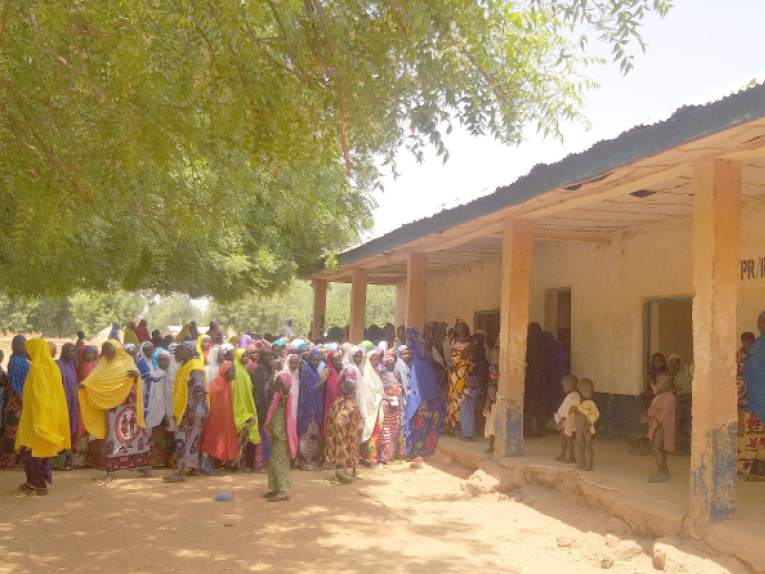Asiya Ahmad, a mother of three, was excited and all smiles after she received N24,000 as a caregiver for her three children who are beneficiaries of the Cash Transfer Programme (CTP) by UNICEF in her local government, Zurmi, Zamfara State.
Asiya, who is from Dauran, said she received the same amount in six trenches and is happy with the programme, considering what she has been able to do with the money.
- NIGERIA DAILY: Killers On Rampage In Plateau, Taraba
- Infracorp: Can Nigeria fix its infrastructural deficit?
“The first time I got for only one child, which was N8,000 because the registration for the other two was not complete. I used N6,000 to buy sewing materials and saved N2000,” she said.
She said she had a tailor that sewed the materials for her which she sold. Afterwards, she said, she started collecting for all the three kids, which she invested in the rearing of goats that she sold after a period of time and then bought others.
Asiya, who does other petty trading, also produces hand fans, which she sell.
She said the programme has helped in improving their lives and they now appreciate more the need to send their children to school, adding that they are grateful to UNICEF for the initiative.
Asiya is not the only excited woman; so are 6,434 other women whose 10,347 children are beneficiaries of the CTP in the three LGAs of Bukkuyum, Maradun and Zurmi across 65 communities in Zamfara State.
Kebbi State has 15,423 caregivers and 31,044 beneficiaries across nine LGAs of Danko Wasagu, Maiyama, Suru, Bagudo, Koko Besse, Shanga, Argungu, Danci and Gwandu.
Cash Transfer programme (CTP)
The CTP is one of the components of the Nigerian Educate A Child Programme (EAC) funded by the Qatar Foundation and implemented by the United Nations Children’s Fund (UNICEF), which aims to bring 501,500 Nigerian children (35% girls) back to school over a period of five years – 2016 to 2021.
The communities were selected from those with a high percentage of out of school children within the eligible 6-11 age bracket, as ascertained through the household community mapping of out of school children conducted in 2016 by UNICEF.
Identified caregivers (mothers or duty bearers with direct responsibility for the children) from the most deprived households are granted six trenches of N8,000 per selected eligible beneficiary child to help reduce the financial burden of schooling them.
Hence the cash transfer is done to cushion the impact of poverty by providing an opportunity for parents to support their children’s education.
Zamfara, Kebbi caregivers’ testimonies
For Fatima Suleiman whose three children are also beneficiaries, she has been able to attend to her children’s school needs with the money she received so far and also invested some into the small business of making groundnut cake and oil and also rearing goats, which she later sold and buys another set.
Gado Sarkin Aski who is from Maikwari community in Suru LGA of Kebbi State, has two children as beneficiaries and she collected only four tranches of the disbursement and missed others because she left the community to take care of her sick mother.
She said she was able to attend to her children’s school needs and started the business of selling wears which included wrappers, hijabs, shoes and others. She also buys animals like goats and chickens to rear and sell.
She said with proceeds from the business, she will see to her children’s needs at school and ensure they complete their education.
For Haji Abdullahi whose two children are benefiting from the scheme, she said there is a big difference in their lives as the children progressed through school and also in petty business.
“Before, I could not provide my children with learning materials or send them to school but I have been empowered. I am taking responsibility for that now and I also buy two to three goats or rams every year for my small farm and I also sell cooking oil,” she said.
While noting that she provides the children with what they needed and sends them to school and Islamiyya School later in the evening, she appreciated the effort of UNICEF and promised to ensure that her children remained in school.
Men speak on the project
The chairman of the SBMC, Aliyu Dalhatu Zurmi, said they have seen the benefits of the programme and were calling for its extension as it has helped them in keeping their wards in school.
“It has helped our women to provide the necessary things, like books and uniforms for their children to go to school, in addition to starting small businesses from which proceeds they train and provide for their children,” he said.
Zurmi said: “Before the programme, if you go to our various communities, you could see just about 30 or 40 children in a school but with the cash transfer, you will see in some schools 100 and some close to 200. So we appreciate the programme and our women are excited about it.”
While urging government to buy in and extend the programme, as part of efforts to develop communities, he said the committee will ensure that parents keep their children in school as the only way they can get more interventions.
The chairman, who noted that 10 of his grandchildren are beneficiaries, said they are grateful and commended the efforts of UNICEF.
Speaking, the Village Head of Makwari, Usman Magaji Makwari, said the programme has assisted his people by empowering them to attend school, adding that there is now competition for children to come to school because of the CTP.
He said before the programme, they used to have issues with parents whose children were not in school because their fathers took them to the farm. In most cases, they took them to court for refusing to allow their wards to go to school.
“But with the cash transfer programme, they invest the money and now attendance in schools is 100 per cent and, since it started, we have not taken any parent to court because they have assistance from UNICEF,” the village head said.
He added that aside from the cash, “we are feeding the children in school every day and that makes attendance in school excellent because difficulty in feeding children was the reason why many were out of school before but with the cash transfer, things are much easier.”
The village head, however, called for more qualified teachers to be posted to the school, saying, “we also want them to be vigilant and bring up extra-curricular activities like football, games that will make the children more competitive and keep them in school.”
Officials’ breakdown
The CTP programme coordinator in Zamfara, Maryam Shantali, said since the inception of the project in 2018, a total of N479,040,000 was disbursed to the caregivers and over 85 per cent of them have invested the money wisely.
“The CTP has led to increase in enrolment, retention and completion by children in Zamfara State as well as the economic empowerment of the caregivers in the two states.”
She said the state is almost achieving the target of 50/50 girls/boys ratio. Zamfara in 2015 had 61 per cent of the total number of out of school children in the country (10.5 million) but with the CTP, it now has 51 per cent, having achieved a 10 per cent reduction.
The Education Secretary of Zurmi LGA, Abdullahi Iliyasu said they surpassed 45-50 per cent enrollment of boys and girls in school, adding that out of school children have been reduced drastically, as a result of the CTP.
He said the government has built classes and that learning materials were supplied by UBEC and SUBEB to reduce crowdedness in schools as a result of increased enrollment.
On sustainability plan
The Zamfara team said a plan has been drafted to get the buy-in of the state government to sustain the programme so as to accommodate more people from other communities.
The chairman, House Committee on Basic Education and Non Formal Education, Yusuf Alhassan Kanoma, said the house is determined to ensure that whatever either SUBEB, or the ministry comes up with on the expansion of the programme, the communities would get the needed support.
He said the house has been able to increase by N1.5 billion the education budget to address the challenges in the sector including the out of school children.
“Regarding the out of schools children, as long as we are reducing the number, we will get to a level where we don’t have them anymore. We will all have them in school because the house is working towards elevating any issue in education,” he said.
For Kebbi, the Acting Permanent Secretary, Bala Magaji, said they needed an interim report with concrete evidence that the project has been successful, including the high and low points to be able to come up with a sustainability plan.
By Chidimma C. Okeke

 Join Daily Trust WhatsApp Community For Quick Access To News and Happenings Around You.
Join Daily Trust WhatsApp Community For Quick Access To News and Happenings Around You.


